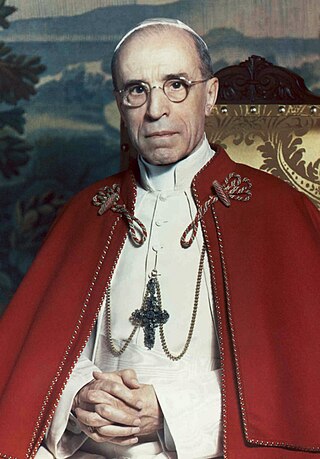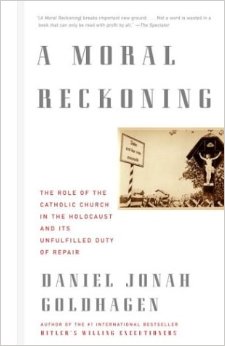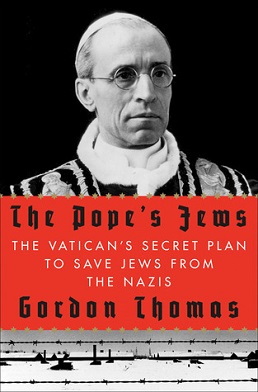Related Research Articles

Pope Pius XII, born Eugenio Maria Giuseppe Giovanni Pacelli, was head of the Catholic Church and sovereign of the Vatican City State from 2 March 1939 until his death in October 1958. Before his election to the papacy, he served as secretary of the Department of Extraordinary Ecclesiastical Affairs, papal nuncio to Germany, and Cardinal Secretary of State, in which capacity he worked to conclude treaties with various European and Latin American nations, including the Reichskonkordat treaty with the German Reich.

Hitler's Pope is a book published in 1999 by the British journalist and author John Cornwell that examines the actions of Eugenio Pacelli, who became Pope Pius XII, before and during the Nazi era, and explores the charge that he assisted in the legitimization of Adolf Hitler's Nazi regime in Germany, through the pursuit of a Reichskonkordat in 1933. The book is critical of Pius' conduct during the Second World War, arguing that he did not do enough, or speak out enough, against the Holocaust. Cornwell argues that Pius's entire career as the nuncio to Germany, Cardinal Secretary of State, and Pope, was characterized by a desire to increase and centralize the power of the Papacy, and that he subordinated opposition to the Nazis to that goal. He further argues that Pius was antisemitic and that this stance prevented him from caring about the European Jews.

La Civiltà Cattolica is a periodical published by the Jesuits in Rome, Italy. It has been published continuously since 1850 and is among the oldest of Catholic Italian periodicals. All of the journal's articles are the collective responsibility of the entire "college" of the magazine's writers even if published under a single author's name. It is the only one to be directly revised by the Secretariat of State of the Holy See and to receive its approval before being published.

A Moral Reckoning: The Role of the Catholic Church in the Holocaust and Its Unfulfilled Duty of Repair is a 2003 book by the political scientist Daniel Jonah Goldhagen, previously the author of Hitler's Willing Executioners (1996). Goldhagen examines the Roman Catholic Church's role in the Holocaust and offers a review of scholarship in English addressing what he argues is antisemitism throughout the history of the Church, which he claims contributed substantially to the persecution of the Jews during World War II.

Robert Leiber, S.J. was a close advisor to Pope Pius XII, a Jesuit priest from Germany, and Professor for Church History at the Gregorian University in Rome from 1930 to 1960. Leiber was, according to Pius's biographer Susan Zuccotti, "throughout his entire papacy his private secretary and closest advisor".
Ronald J. Rychlak is an American lawyer, jurist, author and political commentator. He is a Distinguished Professor of Law at the University of Mississippi School of Law and is holder of the Jamie L. Whitten Chair in Law and Government. He is known for his published works, career as an attorney, and writings on the role of Pope Pius XII in World War II.

Cesare Vincenzo Orsenigo was Apostolic Nuncio to Germany from 1930 to 1945, during the rise of Nazi Germany and World War II. Along with the German ambassador to the Vatican, Diego von Bergen and later Ernst von Weizsäcker, Orsenigo was the direct diplomatic link between Pope Pius XI and Pope Pius XII and the Nazi regime, meeting several times with Adolf Hitler directly and frequently with other high-ranking officials and diplomats.

The relations between Pope Pius XII and Judaism have long been controversial, especially those questions that surround Pope Pius XII and the Holocaust. Other issues involve Pius's Jewish friendships and his attitude towards the new state of Israel.

The relations between Pope Pius XI and Judaism during his reign from 1922 to 1939 are generally regarded as good. The pontiff was particularly opposed to antisemitism, an important issue at the time when Nazi Germany was rising. Certain favourable opinions of Pius XI were subsequently used to attack the perceived silence of Pope Pius XII.

The papacy of Pius XII began on 2 March 1939 and continued to 9 October 1958, covering the period of the Second World War and the Holocaust, during which millions of Jews and Christians were murdered by Adolf Hitler's Germany. Before becoming pope, Cardinal Pacelli served as a Vatican diplomat in Germany and as Vatican Secretary of State under Pius XI. His role during the Nazi period has been closely scrutinised and criticised. His supporters argue that Pius employed diplomacy to aid the victims of the Nazis during the war and, through directing his Church to provide discreet aid to Jews and others, saved hundreds of thousands of lives. Pius maintained links to the German Resistance, and shared intelligence with the Allies. His strongest public condemnation of genocide was, however, considered inadequate by the Allied Powers, while the Nazis viewed him as an Allied sympathizer who had dishonoured his policy of Vatican neutrality.
Pope Pius XII's response to the Roman razzia, or mass deportation of Jews, on October 16, 1943 is a significant issue relating to Pope Pius XII and the Holocaust. Under Mussolini, no policy of abduction of Jews had been implemented in Italy. Following the capitulation of Italy in 1943, Nazi forces invaded and occupied much of the country, and began deportations of Jews to extermination camps. Pius XII protested at diplomatic levels, while several thousand Jews found refuge in Catholic networks, institutions and homes across Italy, including in Vatican City and Pope Pius' Summer Residence. The Catholic Church and some historians have credited this rescue in large part to the direction of Pope Pius XII. However, historian Susan Zuccotti researched the matter in detail and states that there is "considerable evidence of papal disapproval of the hiding of Jews and other fugitives in Vatican properties."
Three Popes and the Jews is a 1967 book by Pinchas Lapide, a former Israeli Consul to Milan, who at the time of publication was a deputy editor in the Israeli Prime Minister's press office. The "three popes" are Pope Pius XII (1939-1958), Pope John XXIII (1958-1963), and Pope Paul VI (1963-1978).
Pope Pius XII's 1942 Christmas address was a speech delivered by Pope Pius XII over Vatican Radio on Christmas 1942. It is notable for its denunciation of the extermination of people on the basis of race, and followed the commencement of the Nazi Final Solution program to exterminate the Jews of Europe. The significance of the denunciation is a matter of scholarly debate.
The conversion of Jews to Catholicism during the Holocaust is one of the most controversial aspects of the record of Pope Pius XII during The Holocaust.

Vatican City pursued a policy of neutrality during World War II, under the leadership of Pope Pius XII. Although the city of Rome was occupied by Germany from September 1943 and the Allies from June 1944, Vatican City itself was not occupied. The Vatican organised extensive humanitarian aid throughout the duration of the conflict.
Pietro Tacchi Venturi was a Jesuit priest and historian who served as the unofficial liaison between Benito Mussolini, the Fascist leader of Italy from 1922 to 1943, and Popes Pius XI and Pius XII. He was also one of the architects of the 1929 Lateran Treaty, which ended the "Roman Question", and recognized the sovereignty of Vatican City, which made it an actor of international relations. A claimed attempt to assassinate Venturi with a paper knife, one year before the treaty's completion, made headlines around the world. Venturi had begun the process of reconciliation by convincing Mussolini to donate the valuable library of the Palazzo Chigi to the Vatican.
The public statements of Pope Pius XII on the Holocaust, or lack thereof, are one of the most controversial elements of the historical debate about Pope Pius XII and the Holocaust. Pius XII's statements have been scrutinized as much, if not more, than his actions during the same period. Pius XII's statements, both public and private, are quite well documented in the Vatican Secret Archives; eleven volumes of documents from his papacy were published between 1965 and 1981 in Actes et documents du Saint Siège relatifs à la Seconde Guerre Mondiale.

The Pope's Jews: The Vatican's Secret Plan to Save Jews from the Nazis is a 2012 book by the British author Gordon Thomas concerning the efforts of Pope Pius XII to protect Jews during the Nazi Holocaust. The Observer reported in 2013 that "Gordon Thomas, a Protestant, was given access to previously unpublished Vatican documents and tracked down victims, priests and others who had not told their stories before" and had uncovered "evidence on Pius XII's wartime efforts to save Jewish refugees".

The raid on the Roman Ghetto took place on 16 October 1943. A total of 1,259 people, mainly members of the Jewish community—numbering 363 men, 689 women, and 207 children—were detained by the Gestapo. Of these detainees, 1,023 were identified as Jews and deported to the Auschwitz concentration camp. Of these deportees, only fifteen men and one woman survived.
The Pius War refer to debates over the legacy of Pope Pius XII and his actions during the Holocaust. The phrase was first coined in a 2004 book of the same name.
References
- ↑ The Silence, debated over Pope Pius XII and the Holocaust; New York Times; 4 February 2001.
- ↑ Right under his nose ; Catholic Herald; 20 April 2001
- ↑ Goldhagen v. Pius XII by Ronald Rychlak.
- ↑ The Silence, debated over Pope Pius XII and the Holocaust; New York Times ; 4 February 2001.
- ↑ Goldhagen v. Pius XII by Ronald Rychlak.
- ↑ Pius XII's terrifying dilemma
- ↑ "Past Winners". Jewish Book Council. Retrieved 24 January 2020.
